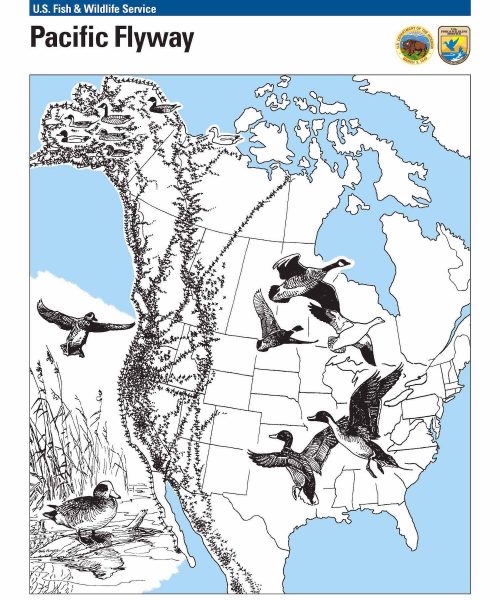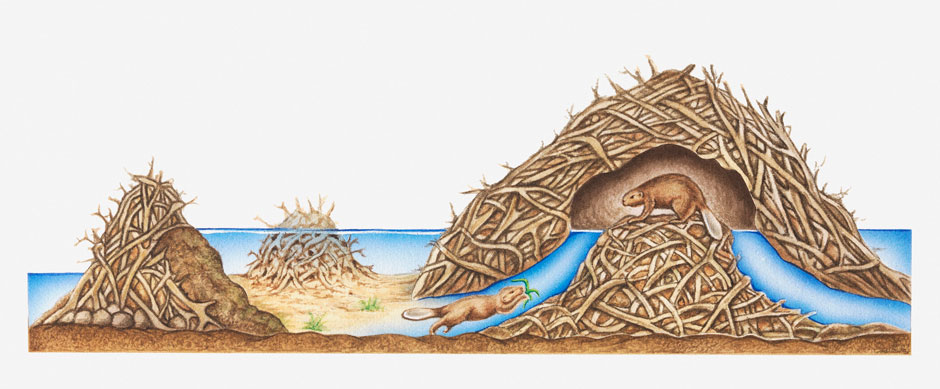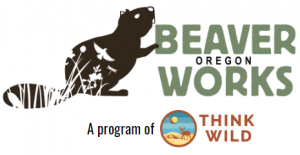How Beavers Benefit Migratory Birds
Beavers are called ecosystem engineers for a good reason. These busy, semi-aquatic mammals create, modify, and maintain habitats that have an enormous impact on the biodiversity in the areas where they live – especially when it comes to migratory birds.
In the central and east Cascades region of Oregon, where water resources can be limited, the presence of beavers and the wetlands they create play a crucial role in supporting the diverse groups of migratory bird species that rely on these habitats during their annual migrations. Conservation efforts focused on maintaining and restoring beaver populations can thus have positive, long-term effects on migratory bird populations in the area. Learn more below on how beavers can specifically support migratory birds.
Beaver Wetlands Provide Essential Stopover Points for Migratory Birds Traveling the Pacific Flyway
Southeastern Oregon is a significant stopover area along the Pacific Flyway, one of four major migratory routes for birds stretching from Alaska to Patagonia.
In fact, this region is so important that the Malheur National Wildlife Refuge was established in 1908, and the Summer Lake Wildlife Refuge Area in 1944, to to protect migratory waterfowl, with an emphasis on colonial nesting species, and associated wetlands.
Beavers create and maintain the essential wetland habitat that provides migratory birds traveling the Pacific Flyway with short term rest stops, nesting and foraging areas during their long journey. More wetlands lead to higher bird diversity and abundance in eastern areas of the Cascades, which has cascading effects on ecosystem health.
Furthermore, beaver dams help to store water and mitigate the effects of drought and climate change. This is especially crucial in arid regions like southeastern Oregon, where water availability and wildfire can be a limiting factor for both human and wildlife communities. By restoring beaver populations and their habitats, water resources can be better managed, benefiting not only migratory birds but also the entire ecosystem.

The Benefits of Beaver for Migratory Birds
Habitat Creation
Beavers are well-known for their ability to create wetlands by damming streams and building ponds.
The wood that beavers bring into the water provides food and shelter for other species, many of which are insects that provide food for many species including fish, frogs, bats, and of course, migratory birds.
The grasses and riparian plants and trees that beaver wetlands support provide crucial breeding, nesting, and foraging grounds for a variety of migratory bird species in the region. Species such as waterfowl, marsh birds, and wading birds are particularly dependent on these wetland habitats.


Food Resources
Beavers alter the landscape by cutting down trees and creating ponds, which leads to the growth of aquatic vegetation and an increase in invertebrate populations like spiders, worms, snails, crawfish and more. These vegetation resources serve as important food sources for migratory birds during their layovers in the region.
Nesting Sites
Beavers create specific patterns of habitats with varying degrees of water depth and vegetation density, providing diverse options for migratory birds to choose safe and suitable nesting sites. Birds such as waterfowl, herons, and songbirds may utilize these habitats for breeding, laying their eggs and raising their young.


Increased Biodiversity
The wetlands created by beavers support a diverse array of plant and animal life as well, which in turn attracts migratory birds seeking food and shelter. Beaver ponds often have a mix of open water, dense vegetation, and marsh, providing habitat for both waterfowl and distinct species of songbirds.
Ecosystem Stability
Beavers are our true ‘eco-partners’! Their activities contribute to ecosystem stability by regulating water flow, reducing unhealthy erosion, and improving water quality. Healthy wetland ecosystems created by beavers support more resilient populations of migratory birds, particularly during times of drought, severe weather, or habitat loss.


